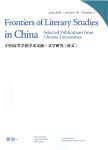Records of a Minor Historian: Lu Xun on Zhang Taiyan
Records of a Minor Historian: Lu Xun on Zhang Taiyan作者机构:Department of Asian Languages and Literatures Pomona College Claremont CA 91711USA
出 版 物:《Frontiers of Literary Studies in China-Selected Publications from Chinese Universities》 (中国高等学校学术文摘·文学研究(英文版))
年 卷 期:2013年第7卷第3期
页 面:367-395页
学科分类:0501[文学-中国语言文学] 0303[法学-社会学] 0502[文学-外国语言文学] 04[教育学] 05[文学]
主 题:Lu Xtm Zhang Taiyan teacher-disciple relations revolutionary,eccentrics madness biography
摘 要:Lu Xun, nearing his death, wrote two essays commemorating Zhang Taiyan. Both are rather unconventional eulogies, which engage the style, themes, and conventions of traditional biographies. Keenly aware of the depictions of his teacher as a conservative Confucian scholar and a political reactionary, Lu Xun provides a counter image. By associating his teacher with prominent revolutionaries and framing his idiosyncratic behaviors and political choices in later life as the product of failed ambition, Lu Xun harks back to the figure of the "mad genius" lauded as exemplars in the classical literary tradition, an image that resonates as well with the gallery of "modem" misanthropes and madmen in his short stories. Cast within a lineage of awakened eccentrics often deemed insane in their own times, Zhang emerges in Lu Xun's essays as a revolutionary par excellence: an outspoken rebel who, after the founding of the Republic, remained a fearless critic of the establishment; an uncompromising radical at heart, who remained committed to the ideals of a true social transformation long since forgotten by those around him. In making the "worthiness" and relevance of Zhang Taiyan as a historical figure legible to modem readers through his engagement with traditional biographical conventions, Lu Xun also affirms the value of a traditional literati culture which continued to structure his worldview as a modem intellectual and writer. For his portrait of the "master of classical studies" as a radical revolutionary, however partial, was an attempt to ensure that Zhang's name would remain relevant to posterity, leaving open the possibility that his teacher's "precious records" might also be transmitted and still find knowing readers in later ages.



